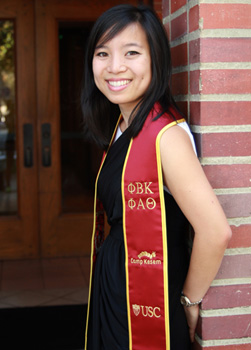
Bijou Nguyen
New University of Southern California graduate Bijou Nguyen focused on the testimonies of one of the least well-known groups persecuted during the Holocaust for her USC Libraries Award second-place research paper The Paradoxical Treatment of Male Homosexual Prisoners During the Holocaust.
USC Libraries’ Research Award encourages the exploration and use of the rich primary source materials held in the USC Libraries and celebrates the excellence of student primary source-based research. It was created by Special Collections librarians Michaela Ullmann and Sue Luftschein and made possible through a Challenge Grant sponsored by Dean Catherine Quinlan of the USC Libraries.
The jury, consisting of Professors Leo Braudy, Joseph Hawkins and Lindsay O'Neill, and undergraduate student Tyler Cundiff, paid special attention to the extent and effectiveness of the use of primary sources in selecting the winning papers. The winners were announced April 21 in USC’s Feuchtwanger Memorial Library.
Nguyen majored in history with a concentration in Ethnicity, Race and Violence and wrote her paper as part of Wolf Gruner’s Comparative Genocide course. She said she’s always been interested in human interactions and the ways that atrocities, such as genocides, were justified or rationalized. For her research paper, she wanted to focus on people other than Jews who were targeted by the Nazis for extermination since they didn’t live up to the Aryan “ideal,” despite being Germans themselves: male homosexuals.
“The paradox is what interested me: Germans were seemingly punishing their own,” Nguyen said. “In addition, coming out is such a huge process for many homosexuals today so I was trying to wrap my mind around what it must have been like for homosexuals in the years before and during the Holocaust.”
In the Visual History Archive, Nguyen watched the testimonies of male homosexual prisoners of the Holocaust as well as other prisoners who mentioned their feelings on homosexuals or provided perspective on how male homosexuals were treated.
She said the small number of relevant testimonies available for her to watch helped illustrate the fact that the vast majority of homosexuals targeted by the Nazis were killed, and survivors may still have been uncomfortable discussing their sexuality even during their testimony decades later.
Watching the testimonies was “humbling,” she said, because it gave a face and voice to the people who suffered and survived through the Holocaust. Listening to the diversity of experiences and how each person was able to survive was also striking, Nguyen said.
“I really recommend that students check out the visual testimonies because this is something very special and unique to USC – an undiscovered gem you might say – and there's so much to learn from it,” she said.
The award, which was limited to undergraduate students during its inaugural year, is now open to undergraduate and graduate students from any field of study. For the 2015 Research Award, the first place award for graduate students will be $1,000, the first place undergraduate student winner will receive $500. The second place award for graduate students is $400, the second place undergraduate student award is $200. Papers may be submitted on an ongoing basis until the deadline of January 20, 2015.